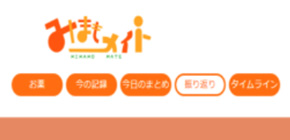
Improving depression using a journal app to support family caregivers
MiMaMo Mate, an app to support families of patients with depression, developed
An increase in the number of patients with clinical depression associated with some 30,000 annual suicide victims is a big social issue. Chronic and persistent clinical depression is a heavy burden to family caregivers, which causes mental health problems in these caregivers in some cases. In many families, a vicious cycle is often seen; the relationship between the depressed family member (patient) and his/her family members worsens, which further worsens the patient’s depression. Under such circumstances, treatment of the patient is not enough and supporting such caregivers becomes necessary in some cases.
Family caregivers tend to have a negative perception to the patient’s condition because they consider caring for him/her a heavy burden. This is because family caregivers cannot cope with the patient’s conditions, so their perception is established based on the scant amount of information that they have. Therefore, if the amount of information they have increase by some measures, they may be able to have an accurate understanding.
A group of researchers led by Professor KUDOU Takashi at the Health Center, Osaka University, and Chief Researcher YAMASHITA Naomi, NTT Communication Science Laboratories, developed MiMaMo Mate, an online journal app to support families of patients with depression.
Cognitive behavioral therapy is a psychotherapeutic therapy to correct biased cognition by adequately collecting information about facts. By using this principle, MiMaMo Mate aimed at facilitating collection of information on a daily basis, confirming past performances, or collecting information about other patients.
MiMaMo Mate asks family caregivers to write down the patient’s activities as “what happened today” in three categories: good events, bad events, and what will be used in the future. To write down these things, family caregivers more often ask or look at the patient, which promotes active communication between the patient and his/her family members. Users can see past description in the form of a chart, so they can understand the history of patient’s conditions. They can also view descriptions by other family caregivers, so they can observe the patient by comparing with other patients.
In this way, MiMaMo Mate helps family caregivers to acquire objective understanding of the patient from multiple aspects. MiMaMo Mate made it possible to correct family caregivers’ awareness (cognition) of the patient and depression, which tends to become a negative one, and to reduce family caregivers’ burden. Through the use of MiMaMo Mate, it was confirmed that (1) family caregiver’s attentiveness towards the patient increased, (2) understanding of patient’s words and actions deepened, and (3) a way of responding to the patient was discovered. These led to the improvement of the patient’s conditions as well.
This study’s results show that MiMaMo Mate was helpful in correcting family caregivers’ understanding about patients and their conditions and in supporting family caregivers of depressed patients. An increase in family members’ attentiveness and understanding of the patient improves communication between the patient and their family caregivers. It is expected that MiMaMo Mate will relieve the symptoms of the depressed patients and become a part of a drug-free treatment therapy. This group will study applications of this technology to other psychiatric disorders, especially dementia.
Abstract
A good home environment is important for recovering from depression, and patients need family caregivers that can cope with their words and actions. In this research, we developed a journal app to support family caregivers, and evaluated its effectiveness in a six-week home use study. Majority of studies on health care informatics focus on how to improve treatment and care of patients. However, studies on how to improve their domestic environment are almost non-existent. This research aims to improve the domestic environment through the actions of family caregivers. Better relationship will also relieve the symptoms of the depressed patients. Decline in suicide rates and increase in productivity is expected as a social ripple effect.

Figure 1

Figure 2

Figure 3
To learn more about this research, please view the full research report entitled “ Ticket-to-Talk: Improving Intra-family Communication ” at this page of the NTT Comunication Science Laboratories website.
Related link
- Mental Health Department, Graduate School of Medicine, Osaka University (link in Japanese)
